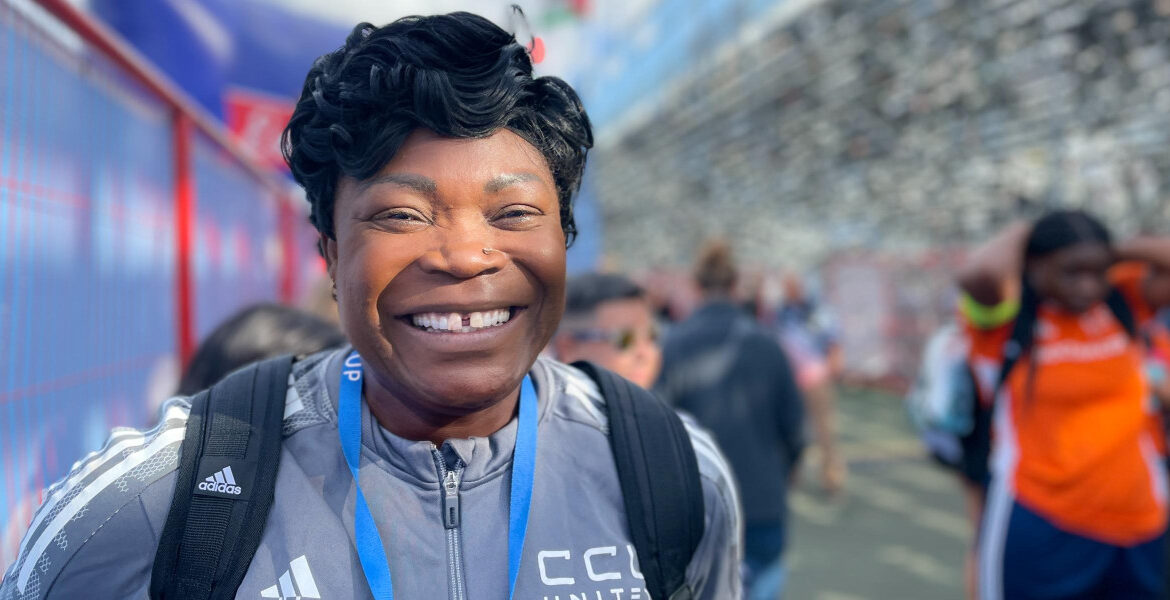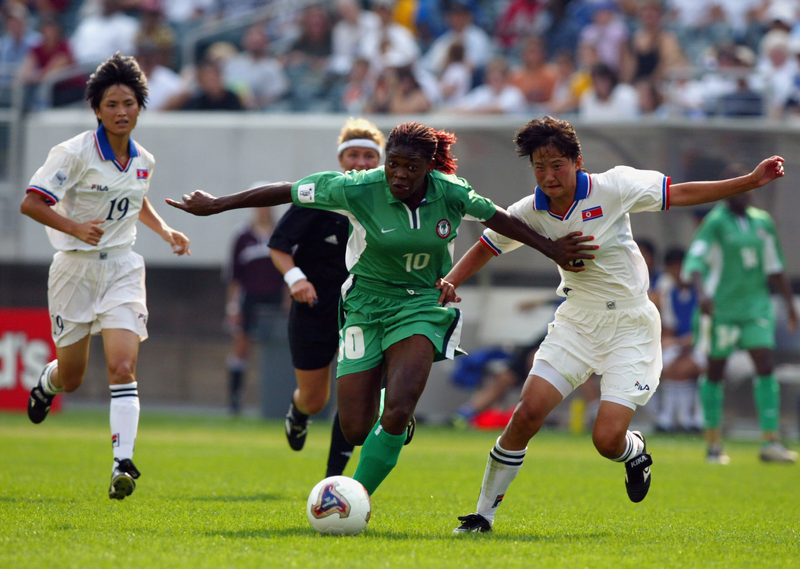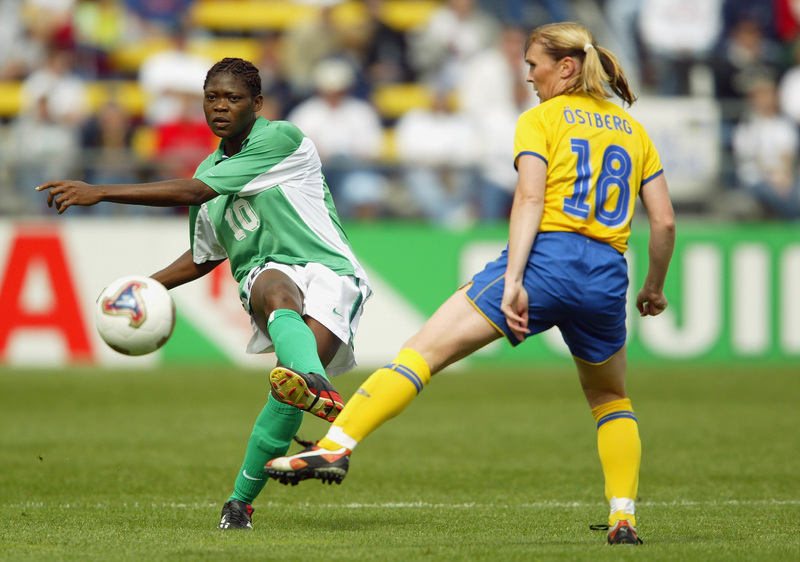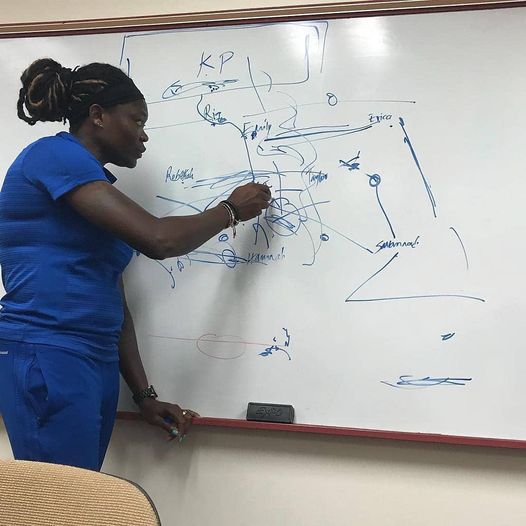
In football, African women have often faced immense challenges—overcoming social constraints, limited resources, and recognition hurdles. Yet, despite these challenges, African women’s football has emerged as a force to be reckoned with, thanks to pioneers who paved the way. As the popularity of women’s football grew globally, the Confederation of African Football (CAF) recognized the need to honor and spotlight African talent. In 2001, CAF introduced the African Women’s Footballer of the Year award, which quickly became a historic milestone. Mercy Akide, a remarkable Nigerian forward, would go on to become the first-ever winner of this award.
Her journey from playing on the fields of Port Harcourt to representing Nigeria on the world stage remains one of the most inspiring stories in African sports. Akide’s achievements have brought attention to African women’s football and inspired countless young women across the continent.
Early Life: From Port Harcourt Fields to Nigeria’s Football Clubs

Mercy Akide’s beginnings were humble but filled with promise. Born and raised in Port Harcourt, Nigeria, she discovered her love for football by playing on local sandy fields at a young age. Known by friends and fans as “Ske,” meaning “skinny” due to her slight build, Akide’s talents were evident from the start. Her speed and precision quickly made her stand out, even as she competed against older boys in her neighborhood.
Akide’s early commitment and perseverance led her to join Garden City Queens in 1988, her first major team in Nigeria. Although Garden City Queens wasn’t one of the top teams in the league, Akide’s performances on the field made her a crowd favorite. Her relentless pursuit of excellence soon attracted the attention of Jegede Babes, one of Nigeria’s leading women’s football teams at the time.
Read: Ademola Lookman: Rising Star in European and African Football
Rising Star: Becoming Nigeria’s Top Scorer
When Akide joined Jegede Babes in 1991, she transitioned into a central midfielder role. This was a challenging shift, but by 1993, Akide had become one of the top goal-scorers in Nigeria’s women’s league. Scoring a record 16 goals in one season and continuing with 15 the next, she earned a national team call-up. Her career continued to blossom as she joined other top clubs like Ufuoma Babes and Pelican Stars, where she continued to dominate as the league’s top scorer.
International Breakthrough: The 1999 Women’s World Cup Heroics

Akide’s talents earned her a place on Nigeria’s Super Falcons squad, and in 1999, she led Nigeria in one of its most memorable campaigns at the FIFA Women’s World Cup in the United States. The 1999 tournament was a defining moment, not only for Nigeria but also for African women’s football as a whole. The Super Falcons, led by Akide, won their first-ever World Cup match against South Korea, where Akide scored a stunning opening goal that would remain iconic in Nigeria’s football history.
In the quarterfinals against Brazil, Akide and her team staged a thrilling comeback after falling three goals behind. Despite eventually losing to a golden goal, Akide’s leadership and Nigeria’s resilience won them global admiration. This tournament solidified her position as a trailblazer and hero in African women’s football.
Achieving History: Africa’s First Women’s Footballer of the Year (2001)

Akide’s impact was recognized in 2001 when CAF awarded her the inaugural African Women’s Footballer of the Year title. As the first African woman to receive such an honor, she became a symbol of possibility and excellence, setting a standard for future generations. Her groundbreaking achievement opened the door for many other African women to pursue football careers and provided a platform to elevate women’s sports across the continent.
Career Transition: From Player to Coach and Mentor

After an illustrious playing career, Akide transitioned to coaching, focusing on youth development in the United States. Her work in youth soccer development and her coaching roles have continued her legacy, nurturing young talent and inspiring girls to see football as a viable career. Akide has served as a coach at Virginia Rush Soccer Club, where her knowledge and experience have been instrumental in shaping future stars. Her commitment to mentoring reflects her desire to give back to the sport and leave a lasting impact on the next generation.
Read: Lookman, Troost-Ekong Make CAF 2024 Awards Nominees for Men’s Categories
Legacy and Influence: A Lasting Impact on African Football
Mercy Akide’s influence on African football extends far beyond her playing days. Her groundbreaking achievements, particularly as the first African Women’s Footballer of the Year, remain a source of pride and inspiration across the continent. Akide has been recognized globally by FIFA, which named her one of its 15 Ambassadors for Women’s Football. Her story resonates with young athletes, particularly in Africa, who see her journey as a testament to the power of perseverance, passion, and resilience.
Through her work, Akide continues to shine as a beacon for women in sports, showing that African women can achieve greatness on the global stage. Her commitment to excellence and pioneering spirit ensure her legacy endures, paving the way for future African stars to follow in her footsteps.
Mercy Akide’s journey from Port Harcourt to becoming Africa’s first Women’s Footballer of the Year remains an enduring inspiration. Her impact has helped elevate African women’s football globally, and her dedication to youth development continues to shape future generations. As a player, coach, and role model, Akide has set an example of resilience, excellence, and pride in one’s heritage.
Join us in celebrating the remarkable achievements of African women in football and the legacy of pioneers like Mercy Akide. Share her story, follow our updates, and stay tuned for more inspiring profiles of women who are changing the game across Africa.
